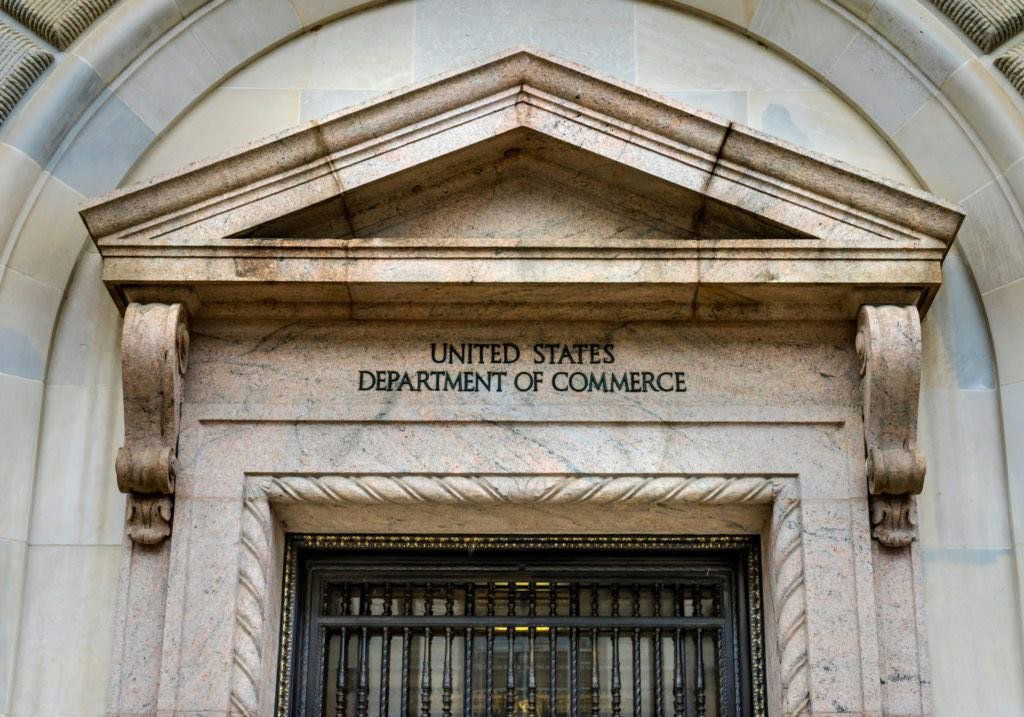
Biden-Harris Administration Highlights Commerce Actions at Launch of White House Council on Supply Chain Resilience
Nov 27, 2023
Biden-Harris Administration Highlights Commerce Actions at Launch of White House Council on Supply Chain Resilience
KCPullen@doc.gov
Mon, 11/27/2023 – 17:15
Export and investment promotion
ICT Supply Chain
Manufacturing
FOR IMMEDIATE RELEASE
Monday, November 27, 2023
Office of Public Affairs
publicaffairs@doc.gov
Today, Deputy Secretary of Commerce Don Graves participated in the inaugural meeting of the White House Council on Supply Chain Resilience. At the event, he highlighted the vital work of Commerce’s Supply Chain Center along with several other key steps the Department is taking to lower costs for American families, strengthen U.S. economic competitiveness, protect U.S. national security, and create good jobs and broad-based economic opportunity by increasing the resilience of supply chains. This work is about more than preventing shortages like those seen at the height of the pandemic, it is about ensuring U.S. companies lead the industries of the future and that all Americans benefit from the prosperity and security that comes with this leadership and freedom from unsustainable dependencies. The fact sheet on the Biden-Harris Administration efforts to strengthen supply chains is [here].
“Increasing U.S. supply chain resilience is, without question, one of the top priorities here at the Department of Commerce,” said Deputy Secretary Graves. “By utilizing a whole-of-Commerce approach, the full force of the Department is working to ensure that we have the tools and resources necessary to create an economy that works for all Americans, starting with resilient supply chains.”
Deputy Secretary Graves described the unique contributions to U.S. supply chain work being made by the newly established Supply Chain Center launched by Commerce earlier this year. Housed in Commerce’s Industry and Analysis unit, the Center aims to be the analytic engine for supply chain resilience policy action within the U.S. Government. The Supply Chain Center integrates industry expertise and data analytics to develop innovative supply chain risk assessment tools and coordinate deep-dive analyses on select critical supply chains to drive targeted actions. The Center is proactive in getting ahead of supply chain challenges, strategic in setting priorities for policy focus and action based on data-driven risk analysis, a force multiplier in improving the targeting and effectiveness of U.S. Government investments, and a partner to industry in building resilient supply chains and supporting U.S. businesses to lead the industries of the future.
Deputy Secretary Graves made additional announcements and highlighted the wide range of contributions Commerce is making as a leader on U.S. supply chain resiliency, which include the following:
Supply Chain Data Summit: The Department, led by the Supply Chain Center and the Industry and Analysis unit, will convene a diverse array of public and private stakeholders at a Supply Chain Data and Analytics Summit in 2024. The event will gather expert input to inform supply chain risk assessment models and tools and facilitate expanded sharing of data and analytic capabilities.
CHIPS Notice of Funding Opportunity: Commerce, along with CHIPS for America, has driven action on semiconductor supply chains. On September 29, Commerce released a second funding opportunity to strengthen the resilience of the semiconductor supply chain, advance U.S. technology leadership, and support vibrant domestic semiconductor clusters. The funding opportunity seeks applications for commercial semiconductor materials and manufacturing equipment facilities with capital investments less than $300 million. It builds upon the Department’s announcement in June 2023 expanding funding to larger supply chain projects. Supply chain applicants are vital to producing semiconductors in the United States, supporting the domestic manufacturing ecosystem, and creating jobs and opportunities in communities across the country.
Manufacturing Extension Partnerships (MEP): Small and medium-sized manufacturers are vital to U.S. supply chains, and Commerce has been expanding its work to support them. Administered by DOC’s National Institute of Standards and Technology, the network of MEPs works to drive innovation and sustainability in manufacturing and build U.S. manufacturing capacity at all tiers in the supply chain ecosystem. In June, MEP awarded more than $20 million across the MEP National network to create the Supply Chain Optimization and Innovation Network, or S-COIN, which will focus on providing supplier scouting services, establishing new service offerings to improve existing supply chain networks, filling gaps in the supply chain by connecting original equipment manufacturers with small and medium-sized manufacturers, and creating a complete map of U.S. supplier capability and capacity.
Indo-Pacific Economic Framework for Prosperity (IPEF): The United States and 13 regional partner nations have substantially concluded negotiations on agreements under IPEF. Commerce has played a leading role in reaching agreement on historic cooperation around supply chains, climate and sustainability, preventing and combatting corruption, and improving tax transparency and tax administration. In particular, the Supply Chain Agreement is a first-of-its-kind, innovative accord that will help build resilience and competitiveness into critical supply chains, and Commerce is kickstarting this effort through pilot projects to enhance the resilience of key supply chains, including those related to semiconductors, critical minerals, and cold chain services.
Census Data Collection: Through the Census Open Innovations Lab (COIL), the Census Bureau is currently in phase 2 of the StatVentures Supply Chain Challenge, which seeks innovative data ideas from the public, industry, and academia to improve measurement of supply chains. Census is also developing new data and visualization tools to expand U.S. Government insights into manufacturing, imports/exports, movement of goods, sale of goods, labor supply, and more.
Bureaus and Offices
U.S. Census Bureau
International Trade Administration
National Institute of Standards and Technology
Leadership
Don Graves
Tags
Indo-Pacific Economic Framework
Read the full report from the U.S. Department of Commerce: Read More



